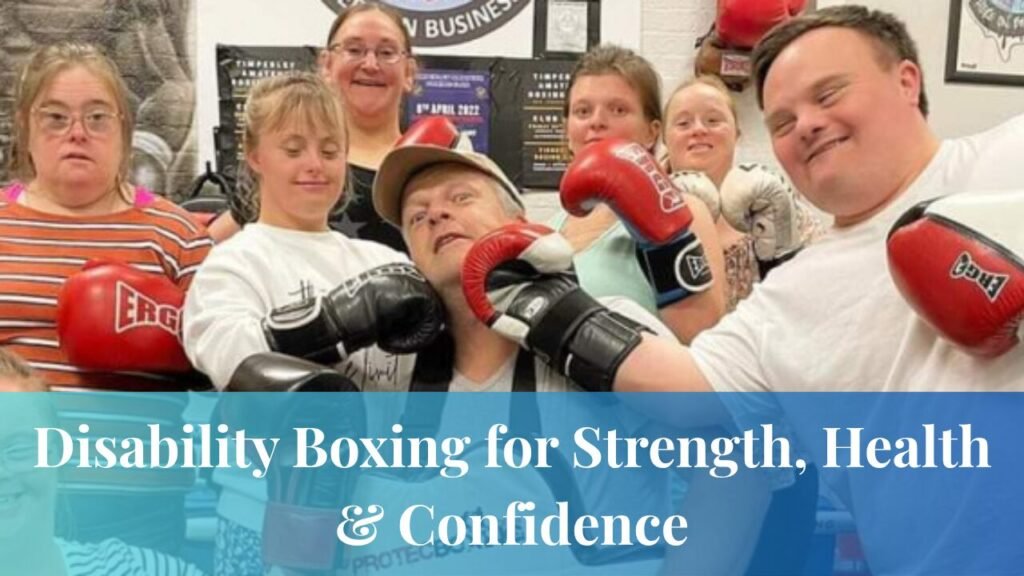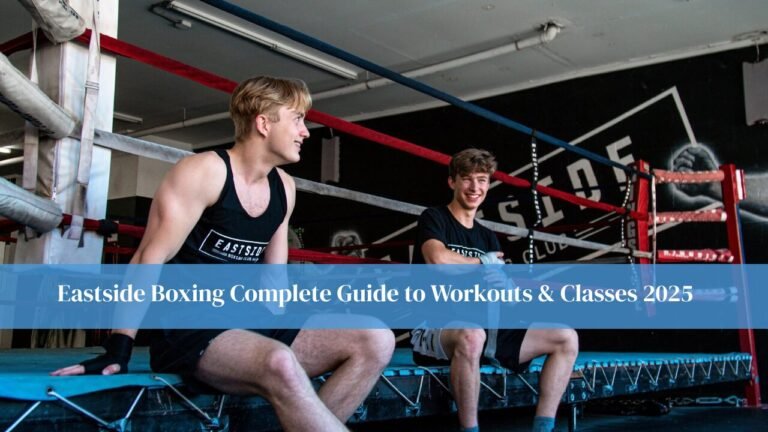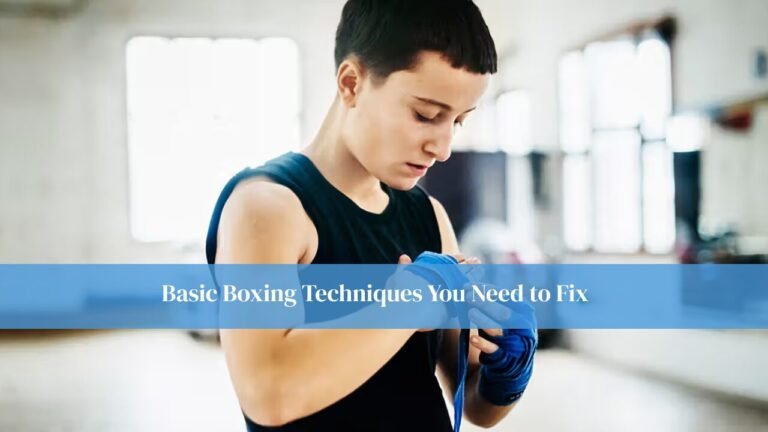Disability boxing is an adaptive version of traditional boxing, specifically designed for individuals with physical, sensory, and cognitive impairments. This form of boxing offers more than just fitness—it fosters confidence, mental well-being, and a sense of belonging. Whether someone is living with autism, cerebral palsy, vision loss, or mobility limitations, disability boxing provides a safe and structured way to engage in physical activity, tailored to their needs and abilities.
The sport encourages participation through carefully adapted programs that take individual needs into account. It’s about offering opportunities, not restrictions, and giving everyone the chance to benefit from the empowering discipline of boxing.
Why Disability Boxing Matters
Disability boxing isn’t just about physical movement it’s about social change. It breaks down barriers and opens doors to spaces that have traditionally excluded people with disabilities. Through boxing, individuals improve their physical fitness while also building mental strength, social connections, and self-esteem in an environment that supports and uplifts them.
For many participants, disability boxing represents more than sport. It’s a statement of inclusion and resilience, offering a sense of purpose, community, and empowerment where they may have previously felt overlooked.
Types of Disability Boxing Programs
Disability boxing programs come in various forms, each tailored to different abilities and preferences. Non-contact boxing offers a low-impact option where individuals can focus on fitness through shadowboxing and pad work, without sparring. It’s especially beneficial for those looking for cardio and coordination training without physical confrontation.
Adaptive boxing incorporates modified equipment and techniques, such as customized gloves or supports for individuals with limited mobility or grip strength. There are also wheelchair boxing programs, which emphasize upper-body conditioning and agility, allowing boxers to train from a seated position. Visually impaired boxing includes tactile cues and verbal instructions, ensuring spatial awareness and safety during sessions.
Real-World Examples and Programs
Several organizations are leading the way in making disability boxing accessible. In the UK, Boxing Essential has created inclusive programs focused on coach training and accessible facilities. They help clubs adapt their spaces and teaching styles to be more welcoming to participants of all abilities.
In Australia, Fit Your Ability provides boxing sessions tailored for people with intellectual disabilities like autism and Down syndrome. These structured programs focus on developing physical skills as well as emotional resilience. The Everybody Moves initiative connects individuals with local adaptive sports options, including boxing, and supports these programs through trained coaches and ongoing evaluation to measure impact.
Who Can Participate?
Disability boxing is open to a broad range of individuals, including children, teens, and adults with physical, intellectual, or sensory disabilities. People recovering from chronic illnesses or injuries may also find value in non-contact boxing as a low-impact option for physical rehabilitation.
Before joining a program, participants are generally advised to seek medical clearance. Coaches typically assess individual needs and adjust sessions to ensure a safe and supportive experience. The flexibility of these programs allows people at various fitness levels to take part confidently and effectively.
Benefits of Disability Boxing
The physical benefits of disability boxing are substantial, including improvements in cardiovascular health, muscle strength, coordination, and mobility. It helps participants develop better reaction times and movement control, which can significantly enhance day-to-day functionality.
Mentally and emotionally, boxing can reduce anxiety and improve emotional regulation. The structure and challenge of the sport contribute to greater self-confidence and independence. Participants often report feeling more motivated and focused, with a renewed sense of achievement and personal drive.
Socially, disability boxing fosters teamwork, friendship, and peer support. It provides an inclusive environment where individuals can set personal goals and develop leadership and communication skills. For many, it’s a powerful opportunity to connect with others and build meaningful relationships.
How Boxing Gyms Are Becoming More Inclusive
Boxing gyms are increasingly recognizing the need to accommodate people with disabilities. Many have begun investing in staff training focused on disability awareness and adaptive coaching methods. These programs help coaches understand a wide range of needs, from neurodiverse learning styles to physical limitations.
Facilities are also evolving. Gyms are installing ramps, widening doorways, and using padded floors to improve safety and accessibility. Some offer sensory-friendly lighting or noise-cancelling options for participants with sensory sensitivities. This shift is supported by local councils and charitable organizations, which often provide funding for equipment and facility upgrades to ensure no one is left behind.
How Disability Boxing Supports Rehabilitation
Disability boxing plays a valuable role in rehabilitation programs, particularly for those recovering from strokes, brain injuries, or surgeries. Its structured nature makes it ideal for rebuilding motor control, balance, and coordination while keeping participants motivated and engaged.
Physiotherapists often integrate boxing movements into recovery sessions. The repetitive and goal-driven approach of boxing can improve posture, fine motor skills, and neuromuscular function. More than just physical recovery, boxing helps individuals build psychological resilience and a positive outlook during challenging recovery periods.
Career Pathways in Disability Boxing
Disability boxing doesn’t only offer benefits to participants—it also opens career pathways for people with disabilities. Many become assistant coaches, mentors, or motivational speakers, using their personal experiences to inspire and guide others.
Other roles include advocacy, program development, and consulting on adaptive fitness. These opportunities not only promote long-term engagement in sports but also empower individuals to shape the future of inclusive fitness communities.
How to Find a Disability Boxing Program Near You
Finding the right program can start with a simple online search. Websites like Boxing Essential list inclusive gyms and programs across various regions, with filters for location and disability type. These directories make it easier for individuals to find suitable training opportunities.
Local boxing clubs are another great resource. Many have inclusive offerings or may be open to starting one if there’s community interest. Health professionals such as physiotherapists and support coordinators can also provide recommendations and collaborate with coaches to tailor training to individual needs. Social media groups often share updates and events related to inclusive sports, connecting people who share similar interests and experiences.
Key Considerations When Starting Disability Boxing
Before getting started, it’s important to take a few key steps. Medical clearance ensures that participants can train safely, and choosing a gym with experienced, inclusive staff is vital for a positive experience. Setting realistic goals helps manage expectations and fosters steady progress.
Consistency is more important than intensity. It’s better to start slow, get comfortable, and build a routine that feels sustainable. Regular communication between coaches, caregivers, and participants ensures the program continues to meet individual needs over time.
FAQs
What equipment is needed for disability boxing?
Typically, participants use:
- Boxing gloves (adapted if needed)
- Hand wraps
- Punch bags and pads
- Wheelchairs (for wheelchair boxing)
- Audio/tactile tools (for sensory adaptations)
Can someone with no boxing experience join?
Absolutely. Most programs are designed for beginners and progress gradually with coach support. The goal is to build confidence and skill at your own pace.
Is disability boxing competitive?
While most programs focus on fitness and fun, some offer competition pathways. These are usually modified and emphasize safety and sportsmanship.
Are there boxing classes for kids with autism?
Yes, many inclusive gyms run sessions specifically for children with autism, using visual schedules, predictable routines, and sensory accommodations to ensure comfort and participation.
How safe is disability boxing?
With trained coaches, proper equipment, and non-contact formats, disability boxing is safe and tailored to each individual’s ability. Risk assessments and continuous monitoring are standard practice in most programs.
Are there online disability boxing classes available?
Yes. Since the pandemic, many organizations have launched virtual training sessions. These are ideal for individuals who prefer home-based workouts or lack local access.
What qualifications should adaptive boxing coaches have?
Coaches should hold certifications in adaptive fitness, disability awareness, and first aid. Some also undergo specialized training in working with neurodiverse or physically challenged populations.
Conclusion
Disability boxing is more than a sport; it’s a movement for inclusion, empowerment, and health equity. As access and awareness grow, more individuals with disabilities can experience the many physical and emotional benefits this dynamic sport offers.
Whether you’re a potential participant, caregiver, or coach, consider exploring disability boxing as a tool for transformation. It’s not just about punching; it’s about proving that ability always finds a way.
From building fitness to building communities, disability boxing holds the promise of a healthier, more inclusive future. With the right support, facilities, and awareness, this empowering sport can continue to break down barriers and uplift lives. Visit boxing essential to explore more.




